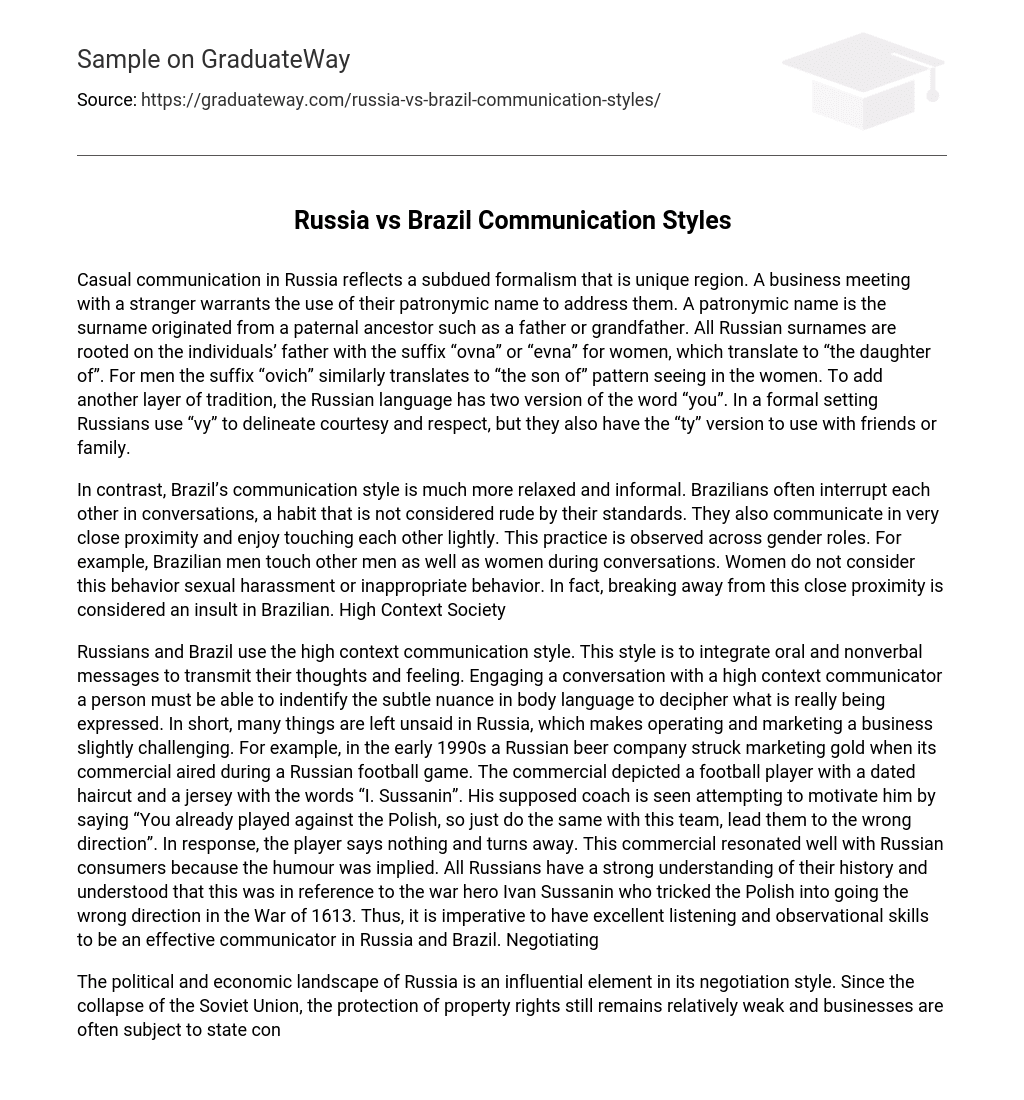In Russia, casual communication has a unique subdued formality. When conducting a business meeting with someone you don’t know, it is customary to address them by their patronymic name. A patronymic name is derived from the paternal ancestor, such as the father or grandfather. All Russian surnames are based on the individual’s father and for women, it ends with the suffix “ovna” or “evna”, meaning “the daughter of”. For men, the suffix “ovich” follows a similar pattern and means “the son of”. Adding another layer of tradition, the Russian language has two versions of the word “you”. In formal settings, “vy” is used to show courtesy and respect. However, there is also the “ty” version, which is used with friends and family.
The communication style in Brazil is notably more relaxed and informal compared to elsewhere. It is common for Brazilians to interrupt each other during conversations without it being considered rude. Additionally, they tend to communicate in close proximity and engage in light physical contact, regardless of gender. This behavior is not seen as sexual harassment or inappropriate. In fact, distancing oneself during conversation is seen as disrespectful in Brazil. This aligns with Brazil being a high context society.
Both Russians and Brazilians employ the high context communication style, which involves integrating oral and nonverbal messages to convey thoughts and feelings. To effectively converse with a high context communicator, one must be able to identify the subtle nuances in body language to understand the true meaning behind their expressions. In Russia, many things are left unsaid, making business operations and marketing somewhat challenging. A prime example of this occurred in the early 1990s when a Russian beer company aired a commercial during a football game. The commercial featured a football player with an outdated haircut and a jersey bearing the name “I. Sussanin”. His supposed coach is seen trying to motivate him by saying, “You already played against the Polish, so just do the same with this team, lead them to the wrong direction”. The player responds by remaining silent and turning away. This commercial resonated with Russian consumers because the humor was implicit. All Russians have a deep understanding of their history and recognized that this was a reference to Ivan Sussanin, a war hero who deceived the Polish by leading them in the wrong direction during the War of 1613. Therefore, possessing exceptional listening and observational skills is crucial for effective communication in Russia and Brazil.
Negotiating
The negotiation style in Russia is heavily influenced by its political and economic landscape. After the Soviet Union’s collapse, property rights protection remains weak and businesses are often subject to state control plagued with nepotism and corruption. As a result, Russian negotiations prioritize short-term gains in business deals. In fact, communication during these negotiations can quickly become contentious and adversarial. It is common for dramatic reactions such as threats to call off a deal, loss of temper, and even leaving the boardroom. Russians believe that one party’s gain should result in the other party’s loss, viewing compromise as a weakness. There is a strong expectation that there can only be one winner in a business deal.
When negotiating in Brazil, leveraging relationships is crucial. Brazilians typically use distributive and contingency bargaining methods. Although the buyer holds a higher position, both parties in a business deal have the responsibility to reach an agreement. Brazilians expect commitment for the long term and prioritize long-term benefits. The primary negotiation style is competitive, and they can be aggressive negotiators. While proposals should demonstrate benefits for both sides, neither party should view attempts to gain competitive advantages negatively. It is important to avoid confrontation and direct conflict during the bargaining process. Ultimately, the culture fosters a win-win approach and values lasting business relationships. Maintaining a positive and persistent attitude will earn respect from counterparts. It is crucial not to openly display aggression or frustration. If a dispute arises at any point in the negotiation, leveraging personal relationships may help reach a resolution.
For a long time, Russia operated agricultural communes, which were communities and public farms that supplied food resources to the local population. Food distribution was equal, promoting cooperation and waste reduction among Russians. As a result, their preference for collective efforts greatly influences their approach to conflict management. When dealing with issues within an organization, it is important to address the group as a whole rather than an individual, aiming to find collaborative solutions. Russians believe that supporting their team members in achieving goals directly benefits them as well, fostering a shared sense of success. They are confident in their ability to work together, make decisions, and demonstrate a willingness to understand opposing perspectives through questioning.
Brazilians have a preference for avoiding direct conflict. When conflicts arise, they are typically handled privately, through a mediator, or by resorting to passive resistance. Instead of expressing their opposition directly, Brazilians aim to solve problems while minimizing open dissent. They place great importance on saving face, a concept that is often overlooked by those who favor direct communication in conflict situations. Saving face involves addressing issues or concerns in a manner that avoids public embarrassment for Brazilians and maintains their self-respect and the respect of others. As a result, blame is not explicitly assigned to anyone but is often implied.





